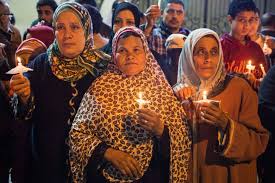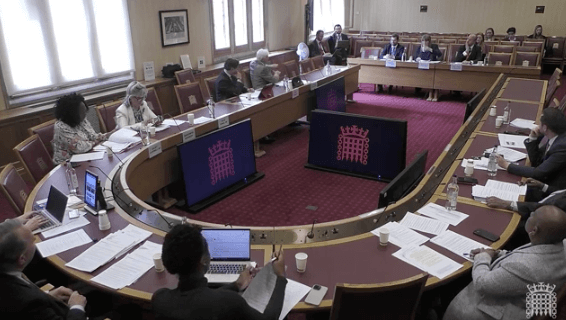https://www.youtube.com/watch?v=HplLXvL7RbY

Coptic Martyrs Commemoration February 15th 2022
There’s an old saying “forgive and forget”.
It’s not a saying I like or one with which I agree.
We should certainly try to forgive but not to forget.
Forgive and remember strikes me as a better maxim– and remembering is what draws us together again on this day, the 15th of February, to recall the martyrdom of the 21 men, the 21 saints, who were brutally beheaded by Islamic State on February 15th, 2015.
Forgiving and remembering is very different from Jihadist calls to revenge and the promotion of an ideology based on the hatred of difference.
For decades I have been involved in the public life of the great city of Liverpool – which describes itself as the whole world in one city.
It was the birthplace of one of the world’s most famous group of popular musicians and one of whose most popular songs is entitled “All You Need Is Love.” Those words are the antidote to the hatred represented by those who would disguise their identity in black masks and then on a beach in Libya, in murderous cold blood, execute a group of men working overseas to support their loved ones in Egypt. It’s the antidote too to the bomber who tried in Liverpool in November last, on Remembrance Day, to commit another atrocity in the name of a twisted ideology based on a distorted view of religion with no regard to the injunction against shedding innocent life and based on hatred rather than love.
It isn’t lost on me that here in the West, yesterday was the day on which we remember the patron saint of lovers – St.Valentine. But recall that he, too, was also a Christian martyr, murdered during the persecution of Christians by the emperor Claudius II in about the year 270.
Down the centuries the blood of the martyrs cries out and, be clear, forgiveness does not imply that those responsible should not be brought to justice or held to account. The Liverpool poet, philanthropist and parliamentarian, William Roscoe, writing about those responsible for the slave trade reminded his readers:
“Forget not, higher still than thee
Sits the great Judge of Nations, who can weigh
The wrong and can repay…who fix’d
The bounds of wrong and right; that gave to all
Their equal blessings, and secures its ends
By penalties severe; which often flow,
But always certain, on the guilty head..”,
And there is much guilt and many wrongs to be accounted for.
During visits to Egypt and more recently to Iraq – in the cradle of civilisation and the cradle of Christianity – I have met members of the ancient churches whose own deep faith and gentle love and extraordinary dignity stands as a rebuke to those who persecute, defile, abduct, rape, and even murder them.
Elsewhere I have seen, too, how Muslims – such as the Uyghurs and Rohingya – and people of all faiths and, indeed, of none – can be on the receiving end of other hateful ideologies – such as that of the Chinese Communist Party that replace another old saying “live and let live” with its emphasis on peaceful and respectful co-existence with “kill and go on killing.”
Whenever I think of what happened in 2015 on that bloodied beach in Libya I cannot also help thinking of Matthew Ayariga, a young West African, probably from Ghana.
Matthew’s decision to stay with his brothers is an extraordinary expression of common humanity and an example of solidarity, sacrifice, and love.
Of the 21 who were murdered in Libya Matthew was the one man who was not an Egyptian, not a Copt.
When the Jihadists told him he would be freed if he rejected Jesus Christ, he responded by saying that that “Their God is my God”.
In September 2020, Matthew’s mortal remains were taken to Egypt so that he could be buried, alongside those other remarkable men, in the church of the Martyrs of Faith built in Al Our.
Matthew, in this extraordinary act of love and solidarity was willing to give his liberty and his life rather than walk away from his Coptic brothers.
It stands as a rebuke to us all who remain silent in the face of the persecution of 250 million Christians worldwide.
His act of extraordinary solidarity shames so many of us when we consider our tepid response – often based on political expediency, institutional considerations, or trade and business – to the persecution which is experienced by religious and ethnic groups the world over – discrimination that morphs into persecution; then persecution which morphs into crimes against humanity; and then ultimately into the crime above all crimes, genocide.
The word genocide is an amalgam of Greek and Latin.
The Greek, genos, refers to who we are, while the Latin word caedo means to cut or to kill.
By contrast the word solidarity binds us as one – and is a call to stand together in common humanity. it’s about hardheaded love in the face of common threats and common enemies.
Heroic bravery in the face of evil demands a better response from us – even if it is only a pale imitation of the remarkable act of solidarity by Matthew Ayariga on that deadly beach in Libya in 2015.
When Matthew Ayariga stood with his Coptic brothers, he did so in an uncommon, atypical, display of common humanity. Are we willing to do the same?


